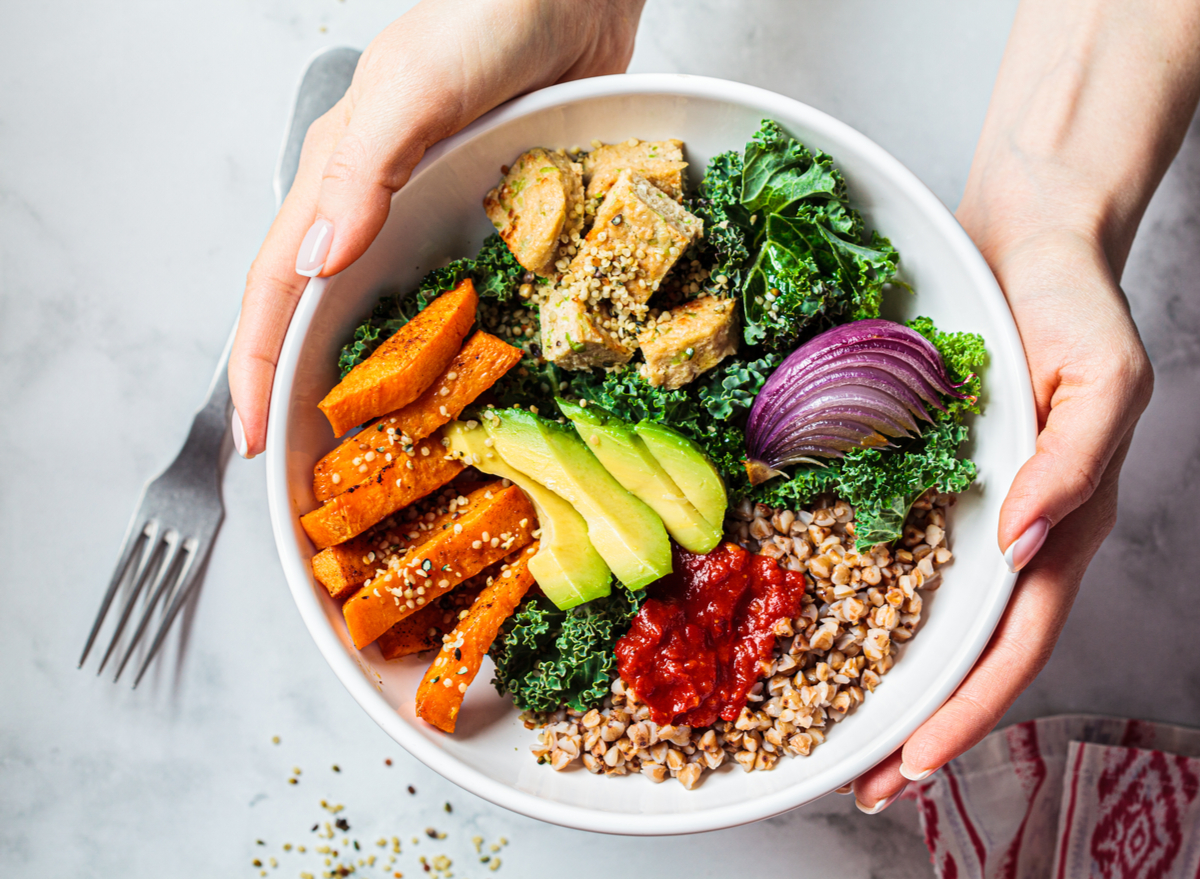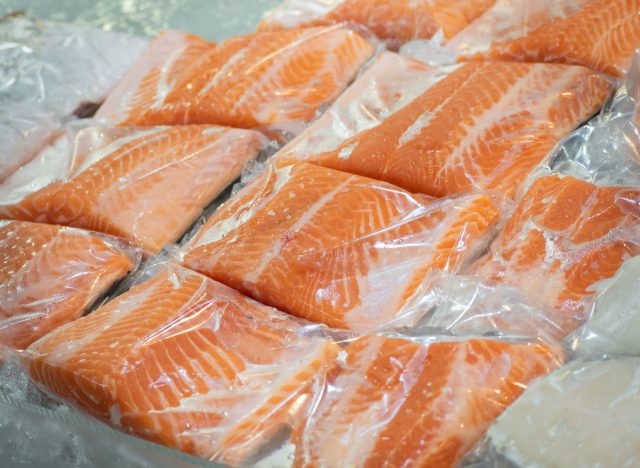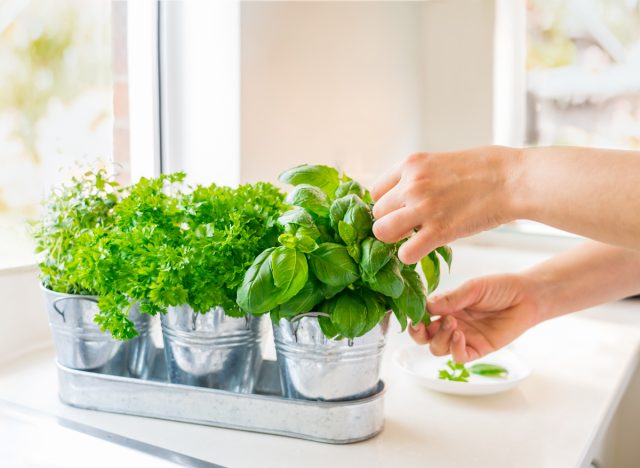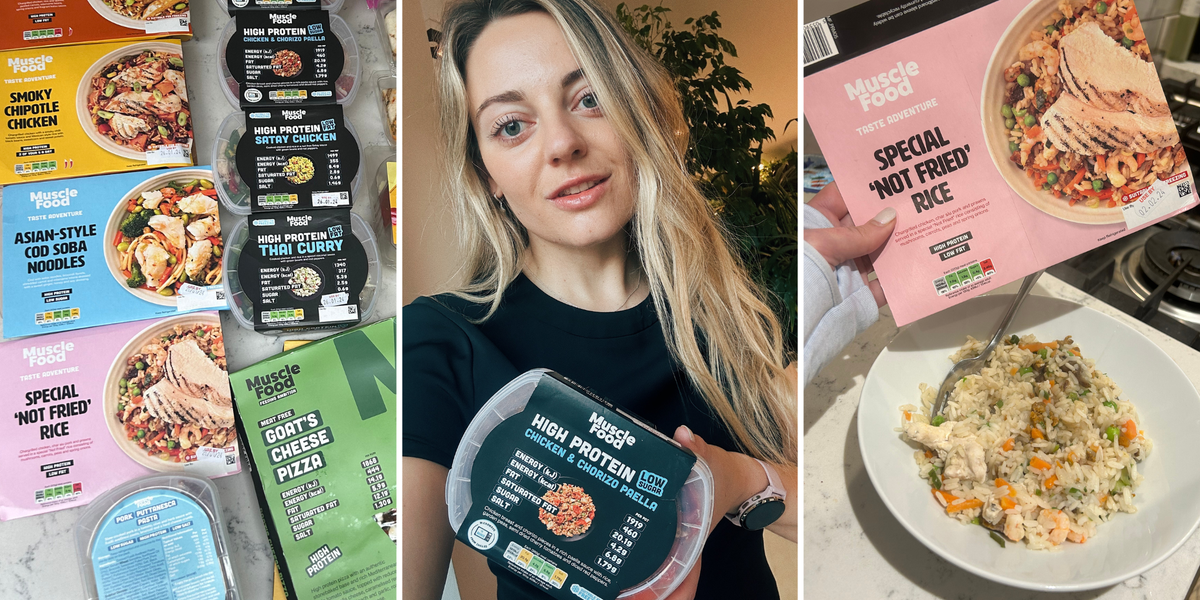
The nutrition industry is always changing, with many new food trends popping up year after year. Some of these trends come and go, but there are a few that nutrition experts say are here to stay in the New Year.
While you may not see fad diets on this list, you will find nutrition trends that will actually make a difference for your health in 2023. Just because these trends are popular right now, doesn’t mean that they won’t have a big impact on our health.
So let’s dive in to find out exactly what experts say you can keep your eyes peeled for in 2023. Read on, and for more, don’t miss Why Most New Year’s Resolutions Fail by February & How To Make Yours Sustainable.
Eat more plants
You don’t have to become a full-fledged vegan to be considered plant-based, and simply increasing plants in your diet has many benefits on its own.
“Plant-based eating is still rising in popularity as one of the biggest health food trends, and will likely continue through 2023 as a more cost-effective way of eating. According to the research, a plant-based lifestyle is linked to improved blood pressure, cholesterol, blood sugar, and a healthier weight. You don’t have to become a full-blown vegetarian to reap these potential benefits – you can start small by incorporating 1-2 meatless meals every week and go from there,” encourages Melissa Mitri, MS, RD of Melissa Mitri Nutrition.
Source sustainable seafood

Sustainable and wild-caught seafood is on the rise as many consumers seek out higher-quality products. Choosing wild-caught Alaskan salmon or sustainably-raised Argentinian Seabass are two of the sustainable seafood front-runners.
“Sustainably sourced and produced foods have gained significant momentum, and I predict will continue to do so in 2023. From sustainably sourced seafood and a focus on plant-based options, there are many ways you can support both your health and that of the planet,” according to Sarah Anzlovar, MS, RDN, LDN, an Intuitive Eating Dietitian for Moms.
Eat more pulses
Beans, peas, and lentils are all pulses and have been shown to improve health in a variety of ways. From the Blue Zones to the Mediterranean Diet, healthy populations around the world include pulses regularly, and they are here to stay in 2023.
“Pulses are a great addition for 2023! Incorporate half a cup of pulses per day for your health: improve gut health, stabilize blood sugar, and lower blood pressure. If you’re not a fan of the texture, white beans can be blended and added to soups and casseroles for a creamy texture that is still nutrition-packed,” Amanda Lane, MS, RD, CDCES of Healthful Lane Nutrition explains.
Focus on family dinners
Dani Lebovitz, MS, RDN, CSSD, CDCES, food literacy expert in Franklin, Tennesee, and founder of Kid Food Explorers tells us why family dinners are trending in 2023: “Although the surge of family meals that occurred during the peak of the pandemic has somewhat fizzled out, an anticipated trend for 2023 is more meals being prepared at home due to rising food costs and inflation,” Lebovitz says.
She continues, “As the research suggests, the return to family meals also aligns with another food-related trend: rejecting diet culture to help kids develop healthy relationships with food. Family meals with responsive parenting practices and supportive feeding environments can positively shape children’s beliefs, attitudes, and eating habits for a lifetime.”
Shop food subscription services
Meal kits have been around for a while now, but new, niche food box services are popping up for nearly every kind of food. From coffee and wine to pasture-raised meat and produce boxes, you can subscribe and get customized products shipped directly to your door.
Some companies that we expect will continue to grow in 2023 are:
Eat intuitively
According to the CDC, during the pandemic, there has been a surge of eating disorder cases in emergency departments from 2019-2022. Intuitive eating and a non-diet approach have become more popular with consumers in recent years. We expect to see this trend continue in 2023 as people seek help for their eating disorders or disordered eating behaviors.
With the rise of intuitive eating, people are turning away from dieting and trying to find a balanced way of eating. We know that years of dieting have a direct effect on our mental health and can create a disordered relationship with food. Seeking out help and working towards a positive relationship with food is a trend we can get behind!
Incorporate cultural foods
A study in the American Journal of Clinical Nutrition was released in December 2021 stating that there is a lack of diversity among nutrition professionals. Many dietitians have since come forward expressing a need for representation of all backgrounds in the field of nutrition, and also in the foods that dietitians recommend to their patients and clients.
“Seeking culturally diverse foods continues to be a trend and priority in both retail and institutional food service. This can provide an opportunity to increase dietary diversity through new types of root vegetables or legumes and incorporate more herbs and spices, which are full of polyphenols that act as antioxidants and fuel our gut microbiota. This trend can also help ensure that as many people are included in conversations about nutrition and health as possible because they see their cultures represented and embraced,” registered dietitian Christina Badaracco, MPH, RDN, LDN tells us.
Opt for a ‘homestead lifestyle’

Farm-to-table takes on a whole new meaning here. Homesteading is the practice of growing your own food and raising your own animals at home. During the pandemic, we have seen a huge rise in folks moving away from the city. Homesteading, or even home gardening, was on the rise after being home more during the pandemic.
Dietitian Lara Clevenger MSH, RDN, CPT notes, “I have loved seeing the homesteading trend rise. Growing your own fruits and vegetables, raising your own livestock, and forming a community with other local homesteaders or farmers changes people’s lifestyles to a slower pace of life. You can control the quality of the produce, how humanely the animals are raised, and the quality of the meat or dairy you eat.”
Choose upcycled food products
Upcycled foods use products that would have otherwise gone to waste. Think fruit rinds, vegetable pulps, and extracted fibers from plants. Just because these would have otherwise gone to waste, doesn’t mean they don’t offer plenty of nutrition!
Upcycled products turn imperfect produce or food that would otherwise be wasted into delicious, edible snacks are just one way you can support both your health and the health of the planet,” Anzlovar says.
Upcycled product examples are popping up everywhere. We love ReGrained for repurposing grains from the beer-making process and creating super nutritious flours. Similarly, The Ugly Company makes discarded fruits into dried fruit snacks.
Stay up-to-date with food labels
A couple of years ago, we saw the Nutrition Facts change with an “Added Sugar” line. Now, we may begin seeing products labeled “Healthy” if they meet a specific set of requirements. Namely, the product must be whole grain, low in fat, added sugar, and salt to qualify for the new label according to a release from the FDA this fall.
Consumers are becoming more invested in the quality of their food, and food companies are listening. Keep your eyes peeled for the new nutrition label in 2023 to keep up with the latest trends in the industry.



:max_bytes(150000):strip_icc()/6183602-b3e4206d75dd4925954984e0745bac58.jpg)